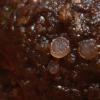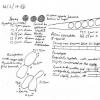
03-02-2026 20:44
Zetti MarioWhen I first saw this white mould on an Agaricus s

18-08-2025 15:07
 Lothar Krieglsteiner
Lothar Krieglsteiner
.. 20.7.25, in subarctic habital. The liverwort i

02-02-2026 21:46
Margot en Geert VullingsOn a barkless poplar branch, we found hairy discs

02-02-2026 14:55
 Andgelo Mombert
Andgelo Mombert
Bonjour,Sur thalle de Lobaria pulmonaria.Conidiome

02-02-2026 14:33
 Andgelo Mombert
Andgelo Mombert
Bonjour,Sur le thalle de Peltigera praetextata, ne

31-01-2026 10:22
 Michel Hairaud
Michel Hairaud
Bonjour, Cette hypocreale parasite en nombre les

02-02-2026 09:29
 Bernard CLESSE
Bernard CLESSE
Bonjour à toutes et tous,Pour cette récolte de 2

01-02-2026 19:29
 Nicolas Suberbielle
Nicolas Suberbielle
Bonjour, Marie-Rose D'Angelo (Société Mycologiq

31-01-2026 09:17
 Marc Detollenaere
Marc Detollenaere
Dear Forum,On decorticated wood of Castanea,I foun
Possibly Ascobolus brassicae or Pseudombrophila bulbifera
Peter Thompson,
18-02-2014 12:34
I have found a brownish operculate discomycete growing on rabbit dung.
I have had a look at previous postings on Ascofrance and think that either Ascobolus brassicae or Pseudombrophila bulbifera are the likely options. There is, however, a distinctive characteristic of my collection which I can not find in the literature - mature spores become brown in lugol.
An image of the fruit bodies is attached, along with a drawing of the microscopy. I have looked at two apothecia and the second had distinctly purple warts on the spores, whereas in the first sample the warts did not look purple. All other characteristics were the same in the two samples. Purple colouration is, of course, more likely in Ascobolus.
Pseudombrophila dentata seems to be ruled out by spore diameter.
I would be grateful for confirmation of one of these, or alternative suggestions for my sample.
Thank you,
Peter Thompson.
Michel Delpont,
18-02-2014 15:12

Re : Possibly Ascobolus brassicae or Pseudombrophila bulbifera
Hello Peter.
In my opinion it is Ascobolus brassicae. Have you controlled the reaction of asci with Melzer, positive or negative?
Michel.
In my opinion it is Ascobolus brassicae. Have you controlled the reaction of asci with Melzer, positive or negative?
Michel.
Peter Thompson,
18-02-2014 16:06
Re : Possibly Ascobolus brassicae or Pseudombrophila bulbifera
Hello Michel,
The Melzers reaction is negative on both the ascus tips and the spores.
I am also seeing some paraphyses which are branched at their tips.
Both characteristics are consistent with Ascobolus brassicae.
With Best Wishes,
Peter.
The Melzers reaction is negative on both the ascus tips and the spores.
I am also seeing some paraphyses which are branched at their tips.
Both characteristics are consistent with Ascobolus brassicae.
With Best Wishes,
Peter.


